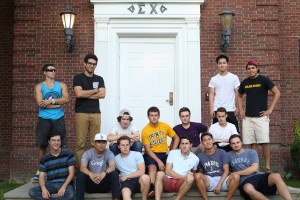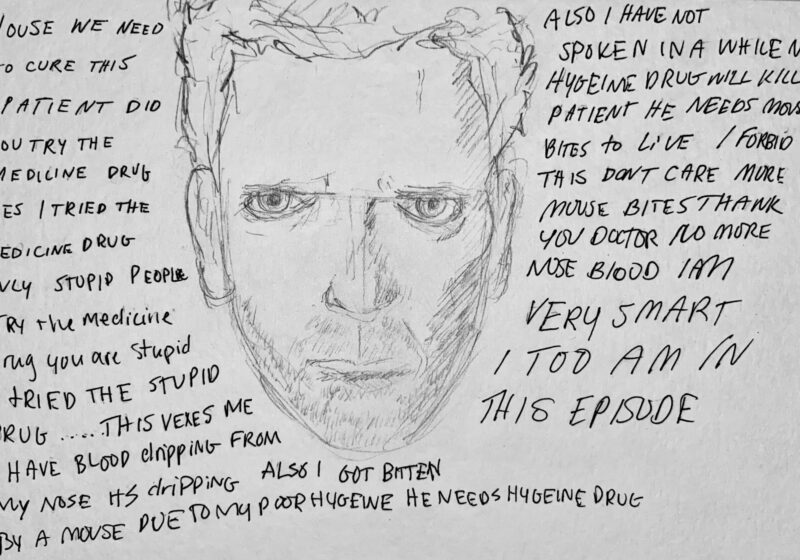Per the findings at a May hearing regarding hazing allegations against Sigma Chi, the fraternity is on censured status until Nov. 15 and will remain on probationary status until 2015.
The incident began on April 19 when Security officers raided the Sigma Chi house and led candidates and brothers away for interrogation. The officers confiscated cell phones, prevented brothers and candidates from communicating, and conducted a series of one-on-one interviews wthe members.
According to Sigma Chi Treasurer Jacob Bohannon, each interview grew “more and more thorough” as officers learned new pieces of information.
The university then issued an Active Avoidance Order, preventing brothers from speaking with candidates during the investigation.
“It didn’t seem like the information they had gotten from the investigation was enough to really screw us to the wall,” Sigma Chi President Josh Bronstein said. “We’ve seen in the past what has happened to other organizations that have gone through similar problems, and that seemed to be what their goal was… but it didn’t seem like they had enough information to meet that end.”
After Security’s initial investigation, charges were delivered to the fraternity. Neither Director of the Center for Student Conflict Management Kyle Orton or Actring Director of Fraternity and Sorority Affairs John DiSarro would comment on the charges or sanctions.
“We do not share the results of a conduct hearing publicly due to the privacy of the individuals involved,” DiSarro said.
According to Bronstein and Bohannon, however, the initial charges delivered in what Orton referred to as a “charge letter” were an alcohol violation that happened three months prior, a sexual harassment charge that was dropped prior to the hearing, and the charge of hazing.
The hearing, held on May 10, followed the proceedings stipulated by the Center for Student Conflict Management (CSCM), which include witness testimony and a board of three faculty and staff members to review the evidence.
Orton did not share the identities of those on the board, but Bohannon said that Sigma Chi was represented at the hearing by himself, Bronstein, and Sigma Chi Magister and Awards Chair Adam Kane.
During the trial, Sigma Chi brought forward witnesses that included brothers and individuals from the new member class to testify on their behalf. UR used one telephone witness to speak about the alcohol policy violation but used no members of the pledge class.
“Most of our questions are typically directed at the respondents (in this case, Sigma Chi) as we believe they are the ones who should have the most information behind the case,” Orton said.
Orton was satisfied with the hearing’s procedure and resulting santions.
“I believe it stuck to our mission, which is an educational process and not to just punitively punish students,” Orton said. “[Sigma Chi] was sanctioned with the belief from UR that we want them to continue… we feel that they should be part of this communnity in some capacity because we want them to be successful.”
Bronstein and Bohannon, however, were frustrated by the charges brought against their fraternity.
Bronstein said that UR’s hazing definition left “a lot of gray area” and that “many things could be considered to cause physical or mental anguish.”
The alcohol violation was a part of the hearing despite having occurred much earlier.
“No matter how well the hazing could be explained, they needed something [to catch us] that was black and white,” Bohannon said.
At the conclusion of the hearing, the board recommended a set of sanctions to Orton, who accepted them.
The fraternity is on censured status until Nov. 15, which means it is temporarily not recognized as a UR fraternity. Its house is considered an “academic living house,” but Sigma Chi brothers and pending members of last spring’s pledge class still live there.
The house must be free of alcohol for the remainder of the year.
Sigma Chi will also remain on probation for a duration of two years, and any violation of the Code of Conduct will result in immediate referral to Orton.
The chapter will also complete a series of educational programs “connected to their values and structuring the leadership of the organization to make them more successful in the future,” DiSarro said.
Such programs center on recruitment practices, alcohol and drug awareness, and a “strategic revisioning” of the brotherhood as an organization.
“They’re working very hard towards regaining full status,” Orton said. “I believe in Sigma Chi to turn things around. If that wasn’t the case, I don’t think I would have sanctioned the way I did. I’m quite confident they will be successful.”
Although Orton and DiSarro are pleased with the progress of Sigma Chi since last spring, Bronstein and Bohannon were less enthusiastic about the expectations.
“We’re kind of just doing what we have to do right now,” Bronstein said. “We want to get back to the place that we were a year ago, and obviously we’ll never be 100 percent back there with all the things we’re going to have to change to appease the school.”
Sigma Chi will be allowed to initiate last spring’s pledge class as soon as its censured status is lifted. They will also be allowed an eight-person pledge class this upcoming spring, a revision that was made to the sanctions following an appeal. All pledging events, however, are now required to be open to the UR and alumni community.
“The pledge process is going to be entirely different than it was when I pledged a few years ago,” Bronstein said. “We’re going to have to figure out how to create the same kind of brothers in a different way.”
Remus is a member of the class of 2014.
Additional reporting by Casey Gould, class of 2014.





